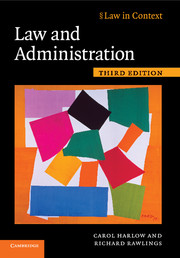Book contents
- Frontmatter
- Contents
- Preface
- Table of Cases
- Table of Statutes
- 1 Red and green light theories
- 2 The changing state
- 3 Transforming judicial review
- 4 Making the law
- 5 Rules and discretion
- 6 Regulation and governance
- 7 Regulatory design and accountability
- 8 Contractual revolution
- 9 Contract, contract, contract
- 10 Into the jungle: Complaints, grievances and disputes
- 11 Tribunals in transition
- 12 The Parliamentary Ombudsman: Firefighter or fire-watcher?
- 13 Inquiries: A costly placebo?
- 14 Continuity and change: Procedural review
- 15 Elite dimension: Court structures and process
- 16 Judicial review and administration: A tangled web
- 17 ‘Golden handshakes’: Liability and compensation
- Index
12 - The Parliamentary Ombudsman: Firefighter or fire-watcher?
Published online by Cambridge University Press: 05 June 2012
- Frontmatter
- Contents
- Preface
- Table of Cases
- Table of Statutes
- 1 Red and green light theories
- 2 The changing state
- 3 Transforming judicial review
- 4 Making the law
- 5 Rules and discretion
- 6 Regulation and governance
- 7 Regulatory design and accountability
- 8 Contractual revolution
- 9 Contract, contract, contract
- 10 Into the jungle: Complaints, grievances and disputes
- 11 Tribunals in transition
- 12 The Parliamentary Ombudsman: Firefighter or fire-watcher?
- 13 Inquiries: A costly placebo?
- 14 Continuity and change: Procedural review
- 15 Elite dimension: Court structures and process
- 16 Judicial review and administration: A tangled web
- 17 ‘Golden handshakes’: Liability and compensation
- Index
Summary
In search of a role
In Chapter 10, we considered complaints-handling by the administration, settling for a ‘bottom-up’ approach. This led us to focus on proportionate dispute resolution (PDR) and machinery, such as internal review, by which complaints can be settled before they ripen into disputes. In so doing, we diverged from the ‘top-down’ tradition of administrative law where tribunals are seen as court substitutes. We returned to the classic approach in Chapter 11, looking at the recent reorganisation of the tribunal service and its place in the administrative justice system. We saw how the oral and adversarial tradition of British justice was reflected in tribunal procedure and considered the importance attached to impartiality and independence, values now protected by ECHR Art. 6(1). We, however, argued that recent reshaping of the tribunal system left unanswered key questions about oral and adversarial proceedings and whether they are always the most appropriate vehicle for resolving disputes with the administration. Would we be better served by inquisitorial and investigatory procedure such as is used by the ombudsman? We looked briefly at ombudsman systems within the UK in Chapter 10, noting an unfortunate degree of fragmentation and considering their relationship with courts. Now we want to look more closely at the way in which ombudsmen work, focusing on the Parliamentary Commissioner (PCA), with whose office truly inquisitorial and investigatory procedure first reached our shores in 1967.
An ‘ombudsman’ is literally a ‘complaints man’, a title suggesting a general grievance-handling function; alternatively, he may be described as a ‘mediator’ (the French title) because he aims at negotiated solutions.
- Type
- Chapter
- Information
- Law and Administration , pp. 528 - 569Publisher: Cambridge University PressPrint publication year: 2009
- 2
- Cited by



